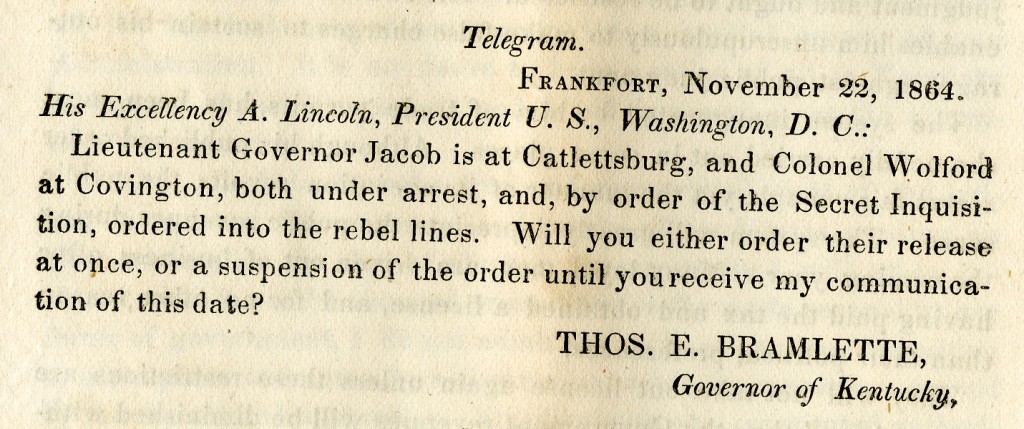by Matthew C. Hulbert
At 4 p.m. on November 9, 1864, Governor Thomas E. Bramlette received an urgent letter from prominent Lexington political general and attorney John B. Huston. The message alarmed Kentucky’s chief executive, to say the very least. According to Huston, Union soldiers had arrived at his home shortly after midnight, arrested him in front of his wife and daughter, and had further plans to expel him “into the Rebel lines.” Huston freely admitted to Bramlette that he’d been campaigning for George McClellan in the upcoming presidential contest of 1864—but also noted that he had every right to do so as a “free man” and as a supporter of the Union “without conditions.” His detention and impending excommunication from Union territory, Huston concluded, had come on the orders of General Stephen Burbridge, commander of the District of Kentucky, in an effort to squelch pro-McClellan voices on the eve of the hotly-contested election.
Lacking the authority to free Huston from the custody of a federal commander, Bramlette immediately telegraphed President Lincoln. “General John B. Huston, a loyal man and prominent citizen” the wire read, “was arrested and yesterday started off by General Burbridge to be sent beyond our lines by way of Catlettsburg, for no other offense than opposition to your re-election … you are doubtless re-elected, but surely cannot sanction this ostracism of loyal men who honestly oppose you.” Lincoln responded almost immediately, signature sarcasm included: “I can scarcely believe that General John B. Huston has been arrested for no other offense than opposition to my re-election, if that had been deemed sufficient cause of arrest, should have heard of more than one arrest in Kentucky on election day.”
 Lincoln sent an order to Burbridge ordering Huston’s release and assured Bramlette that the general had not yet been—and would not be—shipped south. As it turned out, Burbridge had also arrested Colonel Frank Wolford and Bramlette’s own Lieutenant Governor, Richard T. Jacob. “Lieutenant Governor Jacob is at Catlettsburg, and Colonel Wolford at Covington, both under arrest, and, by order of the Secret Inquisition, ordered into the rebel lines,” Bramlette fumed to Lincoln. “Will you either order their release at once, or a suspension of the order until you receive my communication of this date?” Lincoln’s response to this second request lacked the force of the first:
Lincoln sent an order to Burbridge ordering Huston’s release and assured Bramlette that the general had not yet been—and would not be—shipped south. As it turned out, Burbridge had also arrested Colonel Frank Wolford and Bramlette’s own Lieutenant Governor, Richard T. Jacob. “Lieutenant Governor Jacob is at Catlettsburg, and Colonel Wolford at Covington, both under arrest, and, by order of the Secret Inquisition, ordered into the rebel lines,” Bramlette fumed to Lincoln. “Will you either order their release at once, or a suspension of the order until you receive my communication of this date?” Lincoln’s response to this second request lacked the force of the first:
Yours of to-day is received. It seems that Lieutenant Governor Jacob and Colonel Wolford are stationary at present. General Suddarth and Mr. Hodges are here, and the Secretary of War and myself are trying to devise means of pacification and harmony for Kentucky, which we hope to effect soon, now that the passion induced by the exciting subject of the election is passing off. A. Lincoln
This wasn’t enough for the governor; the public outrage Burbridge had fomented with his crackdown on civil liberties was bad for Kentucky and bad for the war effort. Bramlette wired Lincoln again. “If the Headquarters of the Commandant in Kentucky were at Frankfort, where a free interchange of views could be had, it would avoid the evils which have resulted from Burbridge’s weakness.” “But,” he continued, “he [Burbridge] and I cannot hold personal converse after his bad conduct within the last few weeks. Our intercourse must be restricted to official correspondence in writing. It would therefore much facilitate matters to have some commandant with whom I could act on terms of social courtesy and equality.” In other words, Bramlette wanted Lincoln to replace Burbridge—and he wanted it done immediately.
Lincoln refused. Not because the president was loath to playing musical chairs with his top military commanders. McDowell, Pope, Burnside, Hooker, and McClellan (twice) were collective proof enough of that. Rather, Lincoln denied the removal request because at the end of the day, he was a wartime president, and he needed commanders in place who were willing to take bold action—even if those actions occasionally fell between the cracks of civil liberty or even flirted with illegality. Bramlette was no doubt disappointed to learn this hard lesson about Lincoln’s wartime priorities.
Months later, following the spectacular failure of a strategy for stamping out guerrilla violence (that involved executing POWs believed to be irregular combatants and ended up creating new bushwhackers faster than it could hang them), Major General Stephen Burbridge was stripped of his authority and never again reinstated to command. In this, he learned a hard lesson of his own: Lincoln was only willing to look past “secret inquisitions” or to bend the rules for the generals who orchestrated them if it brought the Union closer to ultimate victory. Burbridge failed—and thus took his place among the McDowells and Popes of the Union high command.
Matthew C. Hulbert is an Assistant Editor of the Civil War Governors of Kentucky Digital Documentary Edition.
SOURCES: Thomas E. Bramlette, 1864, “Message to the General Assembly of Kentucky,” Kentucky Department for Libraries and Archives (KDLA).
